Organisational Behaviour Analysis: A Case Study of Wilko's Practices
VerifiedAdded on 2023/06/18
|13
|3985
|347
Report
AI Summary
This report provides an analysis of organisational behaviour within Wilko, a British retail chain, focusing on the influence of organisational culture, politics, and power on employee behaviour. It explores behavioural motivational theories, including content and process theories, and examines different organisational cultures within Wilko, such as power, task, and role cultures, along with their impact on employees. Motivational techniques used by Wilko, like rewards and collaboration, are discussed, and recommendations are made for improving employee motivation and efficiency. Furthermore, the report highlights the benefits of teamwork, including fostering creativity, conflict resolution, and improved communication, and evaluates how concepts and philosophies of organizational behaviour influence behaviour, ultimately affecting Wilko's performance and productivity. The document is contributed by a student and available on Desklib, a platform offering study tools for students.
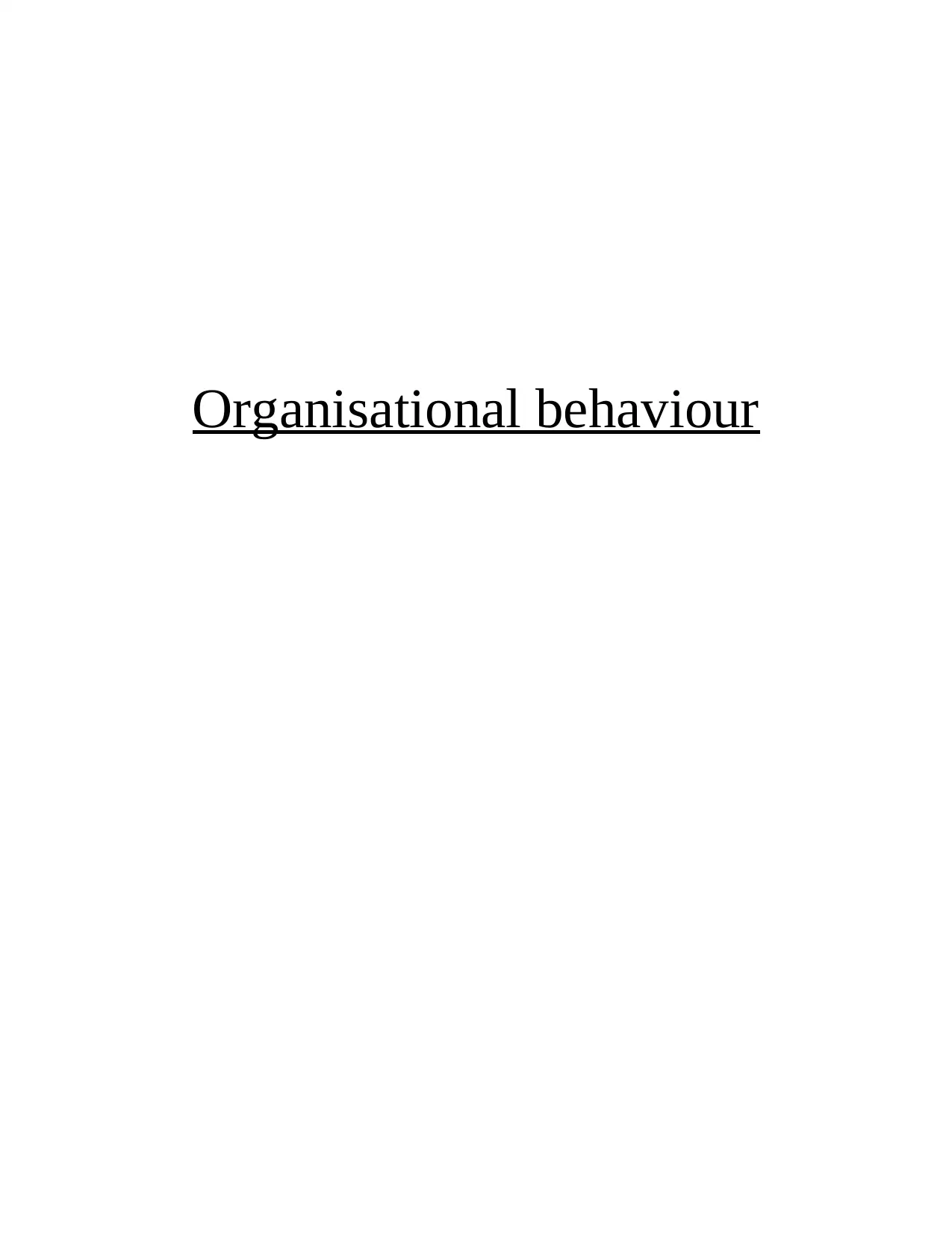
Organisational behaviour
Paraphrase This Document
Need a fresh take? Get an instant paraphrase of this document with our AI Paraphraser
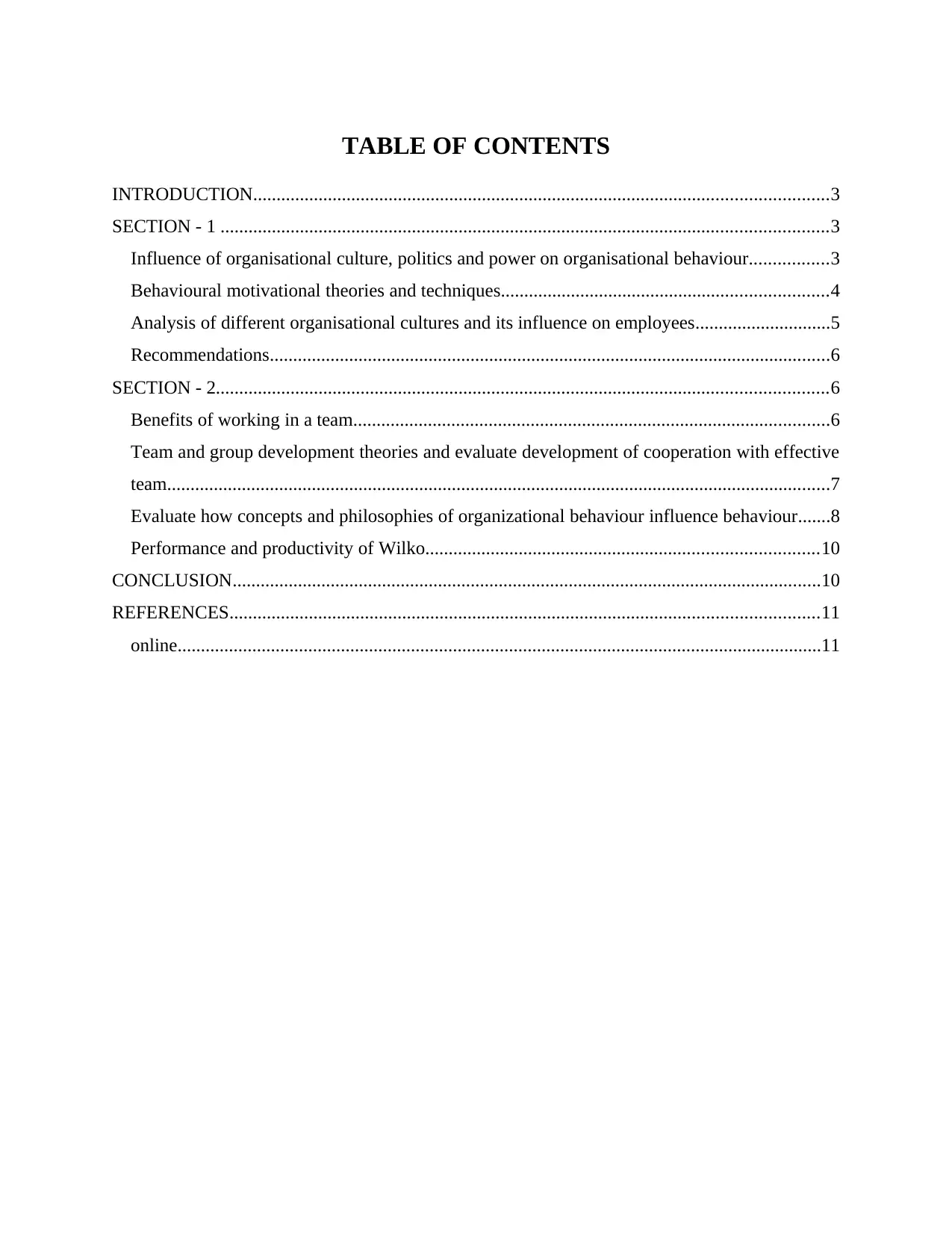
TABLE OF CONTENTS
INTRODUCTION...........................................................................................................................3
SECTION - 1 ..................................................................................................................................3
Influence of organisational culture, politics and power on organisational behaviour.................3
Behavioural motivational theories and techniques......................................................................4
Analysis of different organisational cultures and its influence on employees.............................5
Recommendations........................................................................................................................6
SECTION - 2...................................................................................................................................6
Benefits of working in a team......................................................................................................6
Team and group development theories and evaluate development of cooperation with effective
team..............................................................................................................................................7
Evaluate how concepts and philosophies of organizational behaviour influence behaviour.......8
Performance and productivity of Wilko....................................................................................10
CONCLUSION..............................................................................................................................10
REFERENCES..............................................................................................................................11
online..........................................................................................................................................11
INTRODUCTION...........................................................................................................................3
SECTION - 1 ..................................................................................................................................3
Influence of organisational culture, politics and power on organisational behaviour.................3
Behavioural motivational theories and techniques......................................................................4
Analysis of different organisational cultures and its influence on employees.............................5
Recommendations........................................................................................................................6
SECTION - 2...................................................................................................................................6
Benefits of working in a team......................................................................................................6
Team and group development theories and evaluate development of cooperation with effective
team..............................................................................................................................................7
Evaluate how concepts and philosophies of organizational behaviour influence behaviour.......8
Performance and productivity of Wilko....................................................................................10
CONCLUSION..............................................................................................................................10
REFERENCES..............................................................................................................................11
online..........................................................................................................................................11
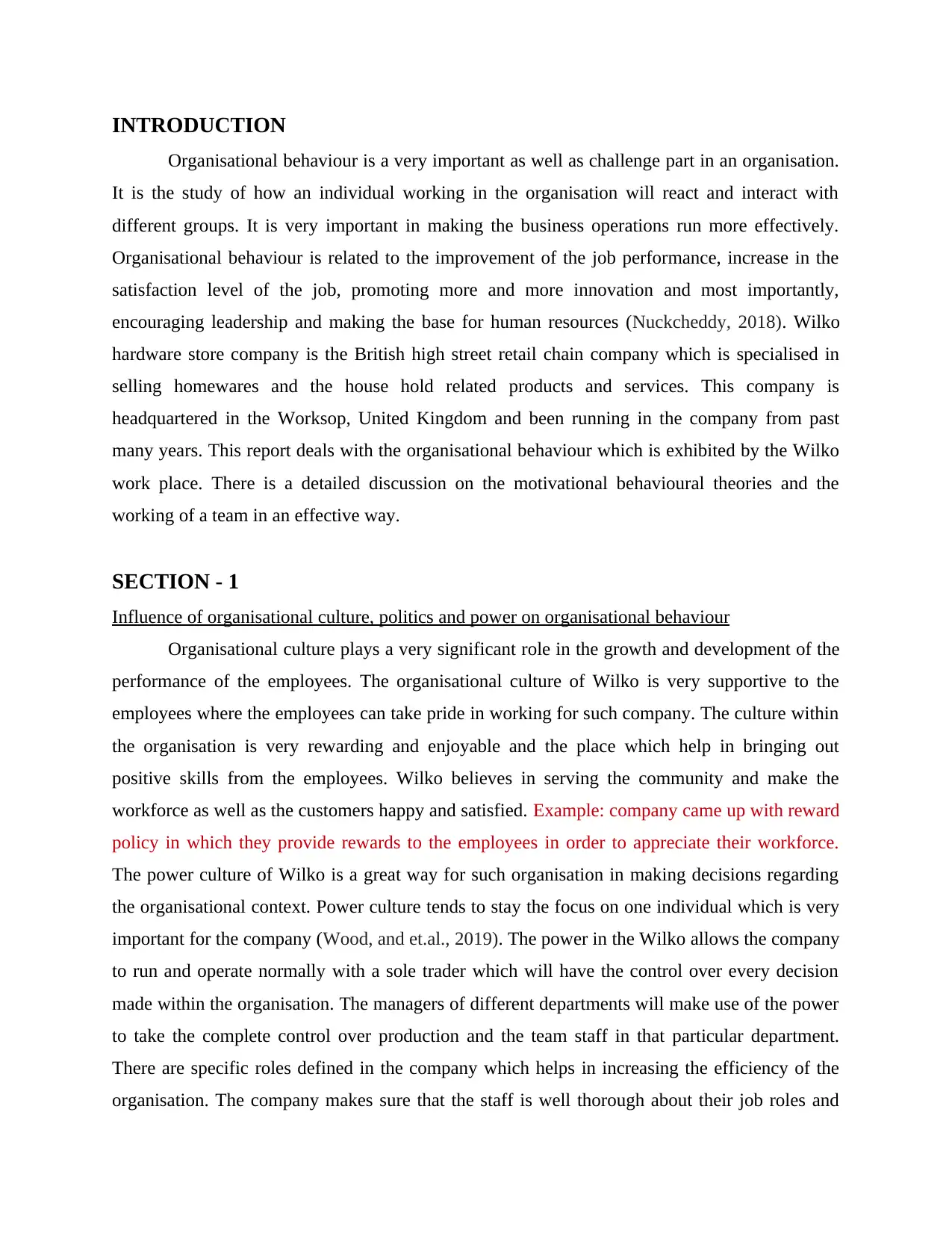
INTRODUCTION
Organisational behaviour is a very important as well as challenge part in an organisation.
It is the study of how an individual working in the organisation will react and interact with
different groups. It is very important in making the business operations run more effectively.
Organisational behaviour is related to the improvement of the job performance, increase in the
satisfaction level of the job, promoting more and more innovation and most importantly,
encouraging leadership and making the base for human resources (Nuckcheddy, 2018). Wilko
hardware store company is the British high street retail chain company which is specialised in
selling homewares and the house hold related products and services. This company is
headquartered in the Worksop, United Kingdom and been running in the company from past
many years. This report deals with the organisational behaviour which is exhibited by the Wilko
work place. There is a detailed discussion on the motivational behavioural theories and the
working of a team in an effective way.
SECTION - 1
Influence of organisational culture, politics and power on organisational behaviour
Organisational culture plays a very significant role in the growth and development of the
performance of the employees. The organisational culture of Wilko is very supportive to the
employees where the employees can take pride in working for such company. The culture within
the organisation is very rewarding and enjoyable and the place which help in bringing out
positive skills from the employees. Wilko believes in serving the community and make the
workforce as well as the customers happy and satisfied. Example: company came up with reward
policy in which they provide rewards to the employees in order to appreciate their workforce.
The power culture of Wilko is a great way for such organisation in making decisions regarding
the organisational context. Power culture tends to stay the focus on one individual which is very
important for the company (Wood, and et.al., 2019). The power in the Wilko allows the company
to run and operate normally with a sole trader which will have the control over every decision
made within the organisation. The managers of different departments will make use of the power
to take the complete control over production and the team staff in that particular department.
There are specific roles defined in the company which helps in increasing the efficiency of the
organisation. The company makes sure that the staff is well thorough about their job roles and
Organisational behaviour is a very important as well as challenge part in an organisation.
It is the study of how an individual working in the organisation will react and interact with
different groups. It is very important in making the business operations run more effectively.
Organisational behaviour is related to the improvement of the job performance, increase in the
satisfaction level of the job, promoting more and more innovation and most importantly,
encouraging leadership and making the base for human resources (Nuckcheddy, 2018). Wilko
hardware store company is the British high street retail chain company which is specialised in
selling homewares and the house hold related products and services. This company is
headquartered in the Worksop, United Kingdom and been running in the company from past
many years. This report deals with the organisational behaviour which is exhibited by the Wilko
work place. There is a detailed discussion on the motivational behavioural theories and the
working of a team in an effective way.
SECTION - 1
Influence of organisational culture, politics and power on organisational behaviour
Organisational culture plays a very significant role in the growth and development of the
performance of the employees. The organisational culture of Wilko is very supportive to the
employees where the employees can take pride in working for such company. The culture within
the organisation is very rewarding and enjoyable and the place which help in bringing out
positive skills from the employees. Wilko believes in serving the community and make the
workforce as well as the customers happy and satisfied. Example: company came up with reward
policy in which they provide rewards to the employees in order to appreciate their workforce.
The power culture of Wilko is a great way for such organisation in making decisions regarding
the organisational context. Power culture tends to stay the focus on one individual which is very
important for the company (Wood, and et.al., 2019). The power in the Wilko allows the company
to run and operate normally with a sole trader which will have the control over every decision
made within the organisation. The managers of different departments will make use of the power
to take the complete control over production and the team staff in that particular department.
There are specific roles defined in the company which helps in increasing the efficiency of the
organisation. The company makes sure that the staff is well thorough about their job roles and
⊘ This is a preview!⊘
Do you want full access?
Subscribe today to unlock all pages.

Trusted by 1+ million students worldwide
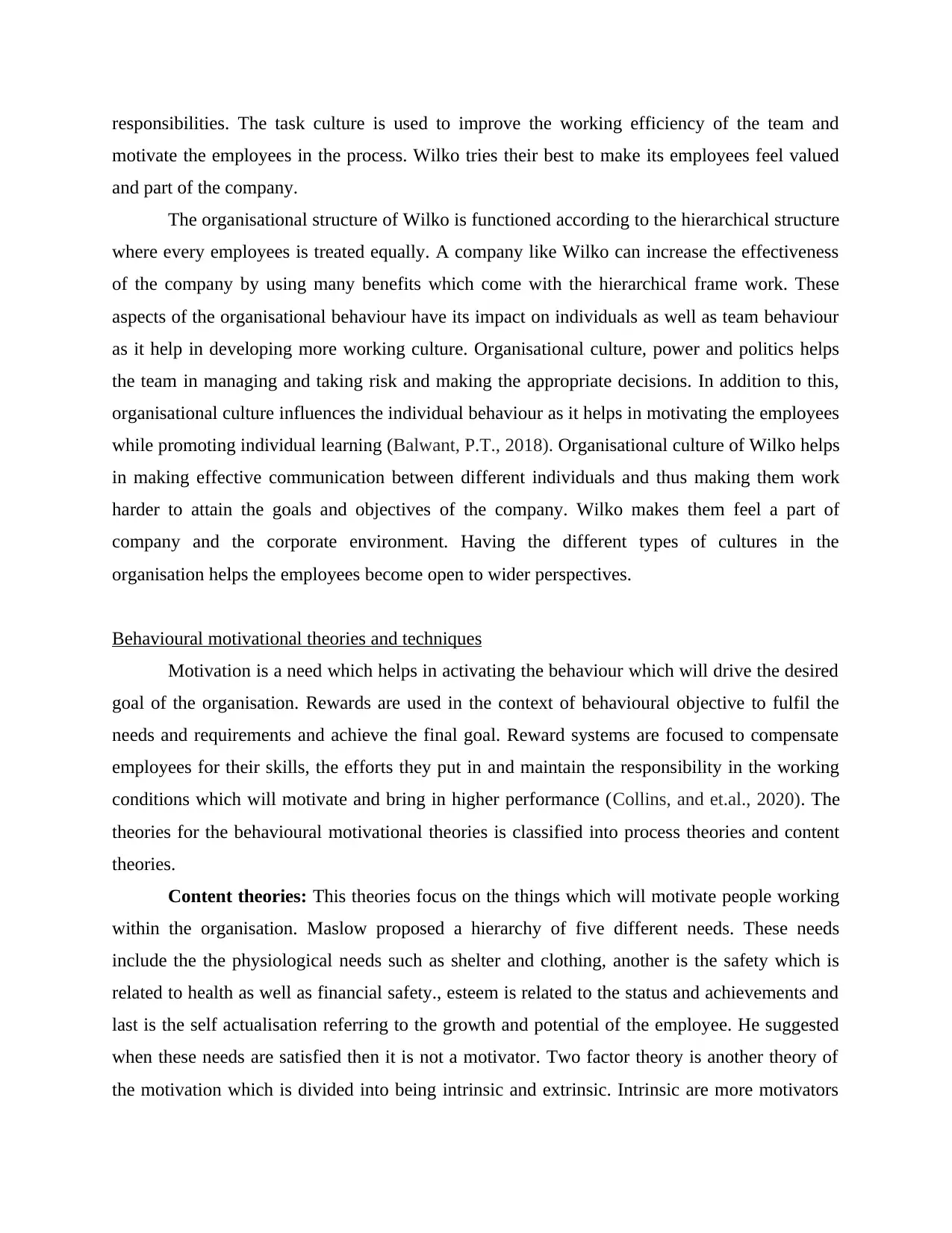
responsibilities. The task culture is used to improve the working efficiency of the team and
motivate the employees in the process. Wilko tries their best to make its employees feel valued
and part of the company.
The organisational structure of Wilko is functioned according to the hierarchical structure
where every employees is treated equally. A company like Wilko can increase the effectiveness
of the company by using many benefits which come with the hierarchical frame work. These
aspects of the organisational behaviour have its impact on individuals as well as team behaviour
as it help in developing more working culture. Organisational culture, power and politics helps
the team in managing and taking risk and making the appropriate decisions. In addition to this,
organisational culture influences the individual behaviour as it helps in motivating the employees
while promoting individual learning (Balwant, P.T., 2018). Organisational culture of Wilko helps
in making effective communication between different individuals and thus making them work
harder to attain the goals and objectives of the company. Wilko makes them feel a part of
company and the corporate environment. Having the different types of cultures in the
organisation helps the employees become open to wider perspectives.
Behavioural motivational theories and techniques
Motivation is a need which helps in activating the behaviour which will drive the desired
goal of the organisation. Rewards are used in the context of behavioural objective to fulfil the
needs and requirements and achieve the final goal. Reward systems are focused to compensate
employees for their skills, the efforts they put in and maintain the responsibility in the working
conditions which will motivate and bring in higher performance (Collins, and et.al., 2020). The
theories for the behavioural motivational theories is classified into process theories and content
theories.
Content theories: This theories focus on the things which will motivate people working
within the organisation. Maslow proposed a hierarchy of five different needs. These needs
include the the physiological needs such as shelter and clothing, another is the safety which is
related to health as well as financial safety., esteem is related to the status and achievements and
last is the self actualisation referring to the growth and potential of the employee. He suggested
when these needs are satisfied then it is not a motivator. Two factor theory is another theory of
the motivation which is divided into being intrinsic and extrinsic. Intrinsic are more motivators
motivate the employees in the process. Wilko tries their best to make its employees feel valued
and part of the company.
The organisational structure of Wilko is functioned according to the hierarchical structure
where every employees is treated equally. A company like Wilko can increase the effectiveness
of the company by using many benefits which come with the hierarchical frame work. These
aspects of the organisational behaviour have its impact on individuals as well as team behaviour
as it help in developing more working culture. Organisational culture, power and politics helps
the team in managing and taking risk and making the appropriate decisions. In addition to this,
organisational culture influences the individual behaviour as it helps in motivating the employees
while promoting individual learning (Balwant, P.T., 2018). Organisational culture of Wilko helps
in making effective communication between different individuals and thus making them work
harder to attain the goals and objectives of the company. Wilko makes them feel a part of
company and the corporate environment. Having the different types of cultures in the
organisation helps the employees become open to wider perspectives.
Behavioural motivational theories and techniques
Motivation is a need which helps in activating the behaviour which will drive the desired
goal of the organisation. Rewards are used in the context of behavioural objective to fulfil the
needs and requirements and achieve the final goal. Reward systems are focused to compensate
employees for their skills, the efforts they put in and maintain the responsibility in the working
conditions which will motivate and bring in higher performance (Collins, and et.al., 2020). The
theories for the behavioural motivational theories is classified into process theories and content
theories.
Content theories: This theories focus on the things which will motivate people working
within the organisation. Maslow proposed a hierarchy of five different needs. These needs
include the the physiological needs such as shelter and clothing, another is the safety which is
related to health as well as financial safety., esteem is related to the status and achievements and
last is the self actualisation referring to the growth and potential of the employee. He suggested
when these needs are satisfied then it is not a motivator. Two factor theory is another theory of
the motivation which is divided into being intrinsic and extrinsic. Intrinsic are more motivators
Paraphrase This Document
Need a fresh take? Get an instant paraphrase of this document with our AI Paraphraser
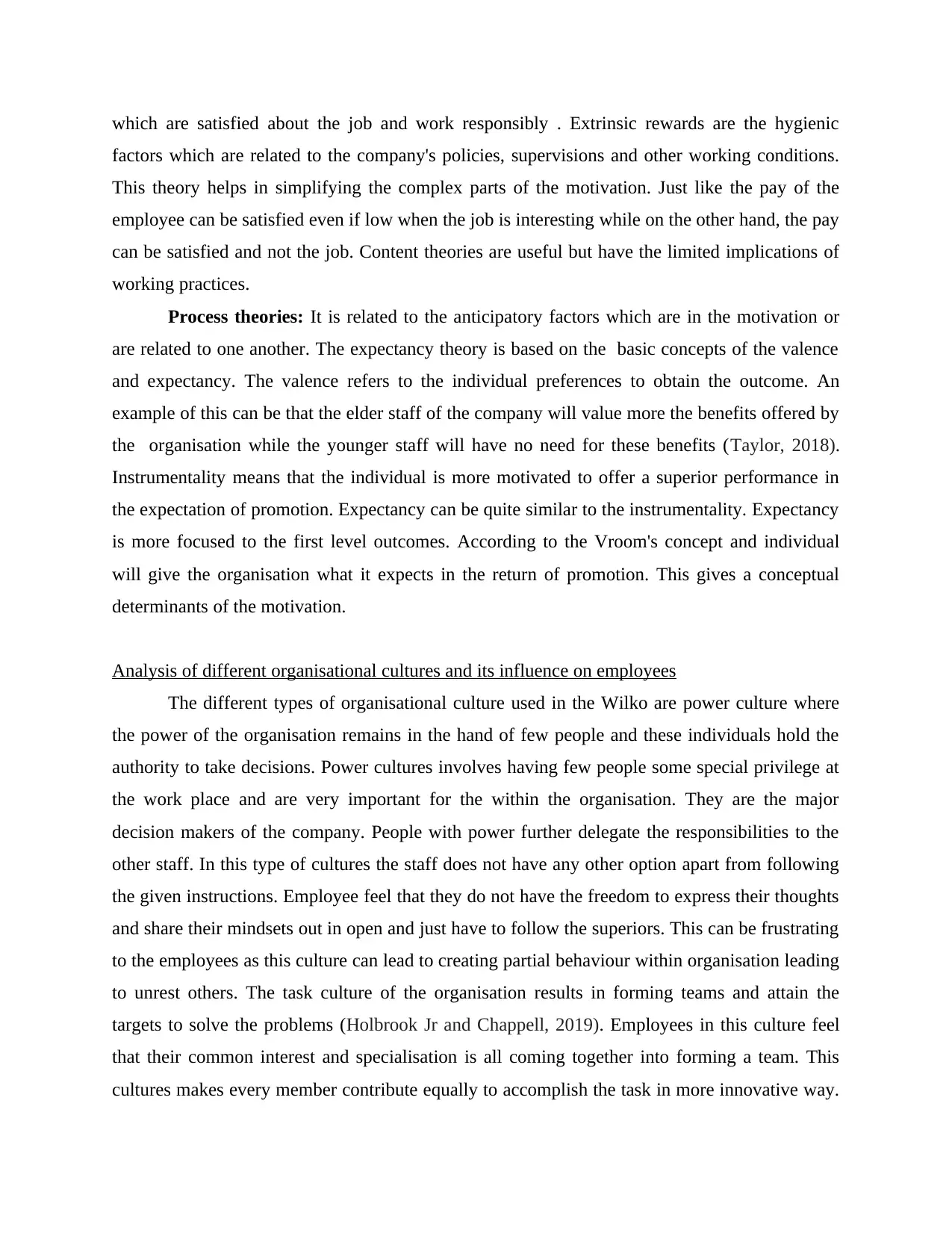
which are satisfied about the job and work responsibly . Extrinsic rewards are the hygienic
factors which are related to the company's policies, supervisions and other working conditions.
This theory helps in simplifying the complex parts of the motivation. Just like the pay of the
employee can be satisfied even if low when the job is interesting while on the other hand, the pay
can be satisfied and not the job. Content theories are useful but have the limited implications of
working practices.
Process theories: It is related to the anticipatory factors which are in the motivation or
are related to one another. The expectancy theory is based on the basic concepts of the valence
and expectancy. The valence refers to the individual preferences to obtain the outcome. An
example of this can be that the elder staff of the company will value more the benefits offered by
the organisation while the younger staff will have no need for these benefits (Taylor, 2018).
Instrumentality means that the individual is more motivated to offer a superior performance in
the expectation of promotion. Expectancy can be quite similar to the instrumentality. Expectancy
is more focused to the first level outcomes. According to the Vroom's concept and individual
will give the organisation what it expects in the return of promotion. This gives a conceptual
determinants of the motivation.
Analysis of different organisational cultures and its influence on employees
The different types of organisational culture used in the Wilko are power culture where
the power of the organisation remains in the hand of few people and these individuals hold the
authority to take decisions. Power cultures involves having few people some special privilege at
the work place and are very important for the within the organisation. They are the major
decision makers of the company. People with power further delegate the responsibilities to the
other staff. In this type of cultures the staff does not have any other option apart from following
the given instructions. Employee feel that they do not have the freedom to express their thoughts
and share their mindsets out in open and just have to follow the superiors. This can be frustrating
to the employees as this culture can lead to creating partial behaviour within organisation leading
to unrest others. The task culture of the organisation results in forming teams and attain the
targets to solve the problems (Holbrook Jr and Chappell, 2019). Employees in this culture feel
that their common interest and specialisation is all coming together into forming a team. This
cultures makes every member contribute equally to accomplish the task in more innovative way.
factors which are related to the company's policies, supervisions and other working conditions.
This theory helps in simplifying the complex parts of the motivation. Just like the pay of the
employee can be satisfied even if low when the job is interesting while on the other hand, the pay
can be satisfied and not the job. Content theories are useful but have the limited implications of
working practices.
Process theories: It is related to the anticipatory factors which are in the motivation or
are related to one another. The expectancy theory is based on the basic concepts of the valence
and expectancy. The valence refers to the individual preferences to obtain the outcome. An
example of this can be that the elder staff of the company will value more the benefits offered by
the organisation while the younger staff will have no need for these benefits (Taylor, 2018).
Instrumentality means that the individual is more motivated to offer a superior performance in
the expectation of promotion. Expectancy can be quite similar to the instrumentality. Expectancy
is more focused to the first level outcomes. According to the Vroom's concept and individual
will give the organisation what it expects in the return of promotion. This gives a conceptual
determinants of the motivation.
Analysis of different organisational cultures and its influence on employees
The different types of organisational culture used in the Wilko are power culture where
the power of the organisation remains in the hand of few people and these individuals hold the
authority to take decisions. Power cultures involves having few people some special privilege at
the work place and are very important for the within the organisation. They are the major
decision makers of the company. People with power further delegate the responsibilities to the
other staff. In this type of cultures the staff does not have any other option apart from following
the given instructions. Employee feel that they do not have the freedom to express their thoughts
and share their mindsets out in open and just have to follow the superiors. This can be frustrating
to the employees as this culture can lead to creating partial behaviour within organisation leading
to unrest others. The task culture of the organisation results in forming teams and attain the
targets to solve the problems (Holbrook Jr and Chappell, 2019). Employees in this culture feel
that their common interest and specialisation is all coming together into forming a team. This
cultures makes every member contribute equally to accomplish the task in more innovative way.
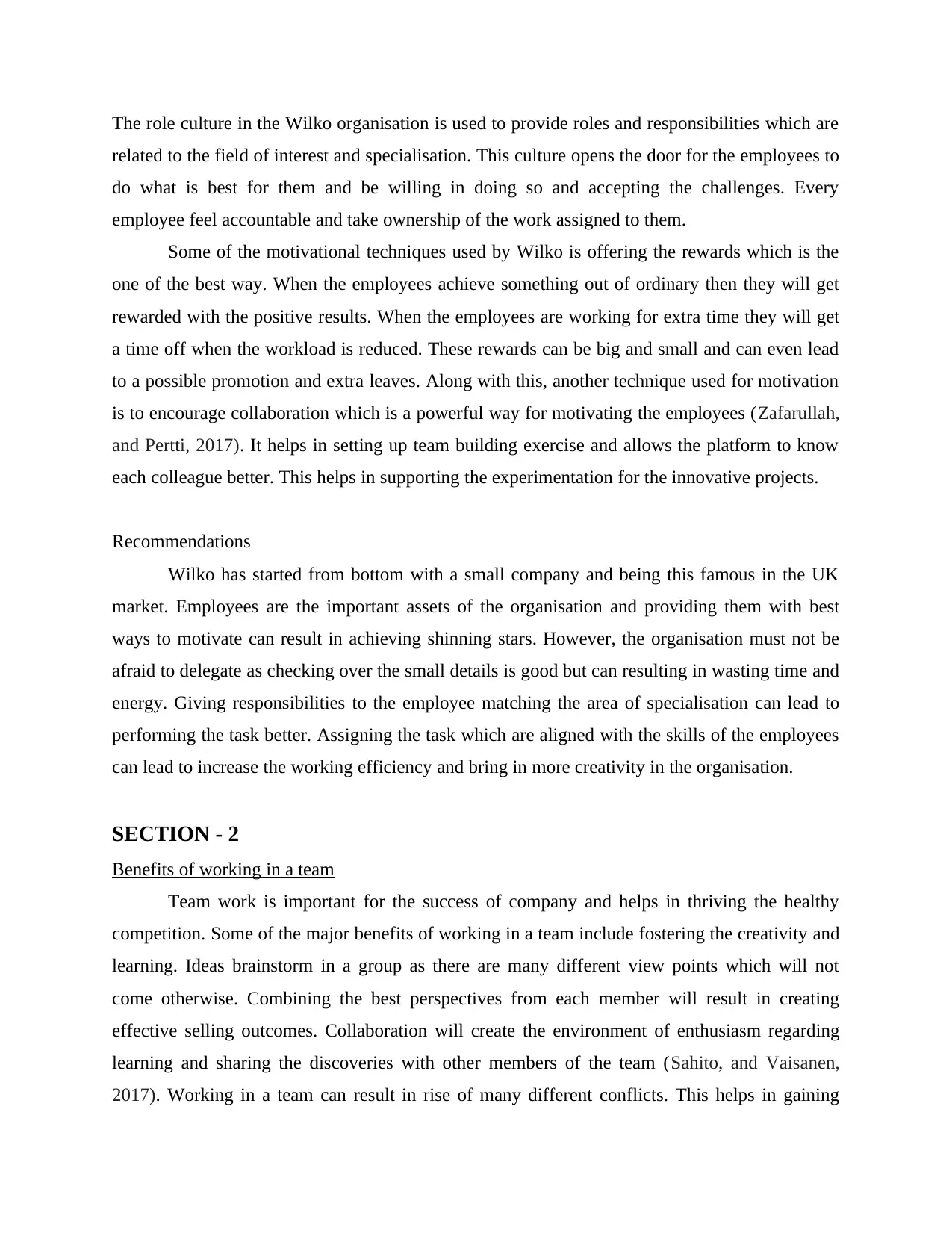
The role culture in the Wilko organisation is used to provide roles and responsibilities which are
related to the field of interest and specialisation. This culture opens the door for the employees to
do what is best for them and be willing in doing so and accepting the challenges. Every
employee feel accountable and take ownership of the work assigned to them.
Some of the motivational techniques used by Wilko is offering the rewards which is the
one of the best way. When the employees achieve something out of ordinary then they will get
rewarded with the positive results. When the employees are working for extra time they will get
a time off when the workload is reduced. These rewards can be big and small and can even lead
to a possible promotion and extra leaves. Along with this, another technique used for motivation
is to encourage collaboration which is a powerful way for motivating the employees (Zafarullah,
and Pertti, 2017). It helps in setting up team building exercise and allows the platform to know
each colleague better. This helps in supporting the experimentation for the innovative projects.
Recommendations
Wilko has started from bottom with a small company and being this famous in the UK
market. Employees are the important assets of the organisation and providing them with best
ways to motivate can result in achieving shinning stars. However, the organisation must not be
afraid to delegate as checking over the small details is good but can resulting in wasting time and
energy. Giving responsibilities to the employee matching the area of specialisation can lead to
performing the task better. Assigning the task which are aligned with the skills of the employees
can lead to increase the working efficiency and bring in more creativity in the organisation.
SECTION - 2
Benefits of working in a team
Team work is important for the success of company and helps in thriving the healthy
competition. Some of the major benefits of working in a team include fostering the creativity and
learning. Ideas brainstorm in a group as there are many different view points which will not
come otherwise. Combining the best perspectives from each member will result in creating
effective selling outcomes. Collaboration will create the environment of enthusiasm regarding
learning and sharing the discoveries with other members of the team (Sahito, and Vaisanen,
2017). Working in a team can result in rise of many different conflicts. This helps in gaining
related to the field of interest and specialisation. This culture opens the door for the employees to
do what is best for them and be willing in doing so and accepting the challenges. Every
employee feel accountable and take ownership of the work assigned to them.
Some of the motivational techniques used by Wilko is offering the rewards which is the
one of the best way. When the employees achieve something out of ordinary then they will get
rewarded with the positive results. When the employees are working for extra time they will get
a time off when the workload is reduced. These rewards can be big and small and can even lead
to a possible promotion and extra leaves. Along with this, another technique used for motivation
is to encourage collaboration which is a powerful way for motivating the employees (Zafarullah,
and Pertti, 2017). It helps in setting up team building exercise and allows the platform to know
each colleague better. This helps in supporting the experimentation for the innovative projects.
Recommendations
Wilko has started from bottom with a small company and being this famous in the UK
market. Employees are the important assets of the organisation and providing them with best
ways to motivate can result in achieving shinning stars. However, the organisation must not be
afraid to delegate as checking over the small details is good but can resulting in wasting time and
energy. Giving responsibilities to the employee matching the area of specialisation can lead to
performing the task better. Assigning the task which are aligned with the skills of the employees
can lead to increase the working efficiency and bring in more creativity in the organisation.
SECTION - 2
Benefits of working in a team
Team work is important for the success of company and helps in thriving the healthy
competition. Some of the major benefits of working in a team include fostering the creativity and
learning. Ideas brainstorm in a group as there are many different view points which will not
come otherwise. Combining the best perspectives from each member will result in creating
effective selling outcomes. Collaboration will create the environment of enthusiasm regarding
learning and sharing the discoveries with other members of the team (Sahito, and Vaisanen,
2017). Working in a team can result in rise of many different conflicts. This helps in gaining
⊘ This is a preview!⊘
Do you want full access?
Subscribe today to unlock all pages.

Trusted by 1+ million students worldwide
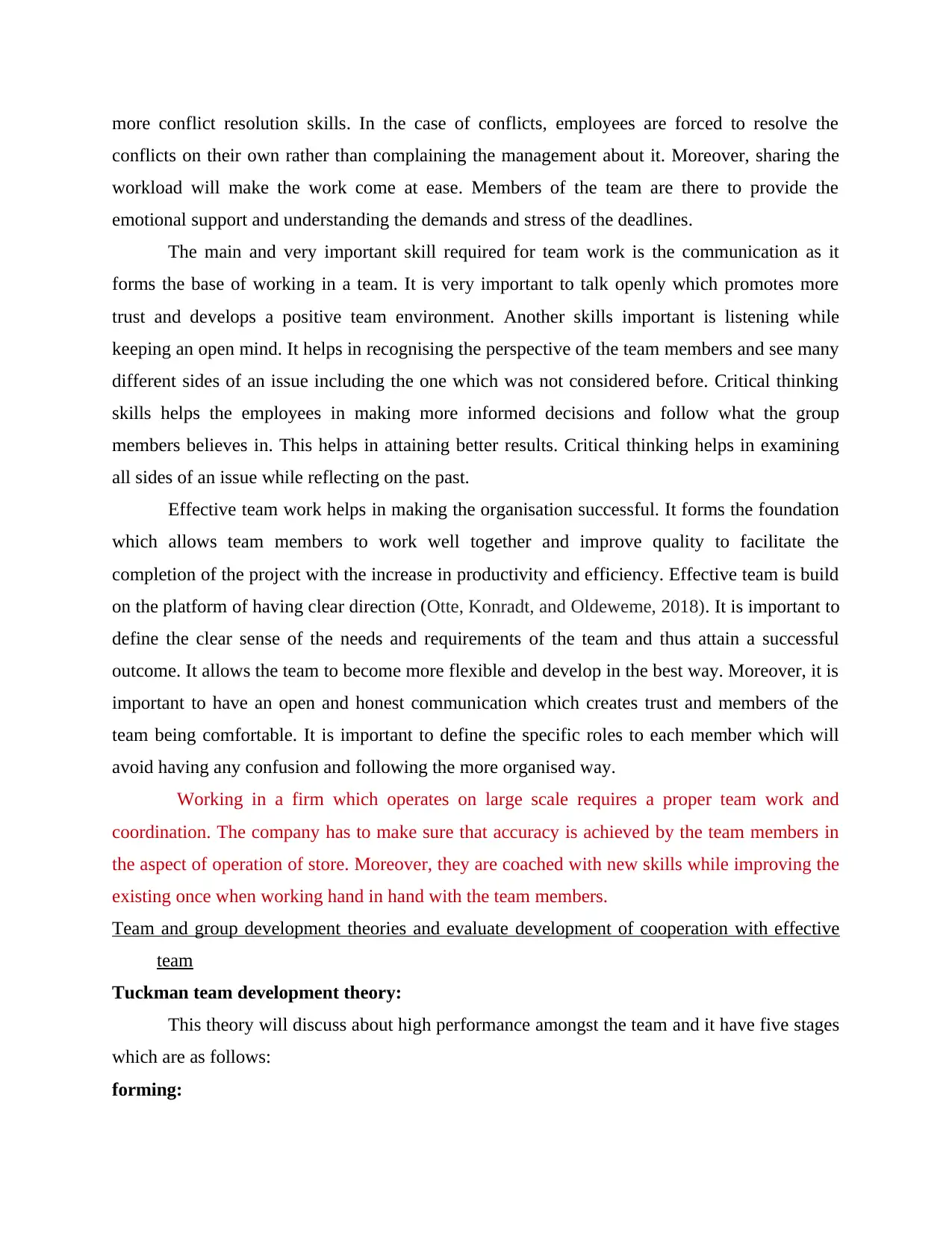
more conflict resolution skills. In the case of conflicts, employees are forced to resolve the
conflicts on their own rather than complaining the management about it. Moreover, sharing the
workload will make the work come at ease. Members of the team are there to provide the
emotional support and understanding the demands and stress of the deadlines.
The main and very important skill required for team work is the communication as it
forms the base of working in a team. It is very important to talk openly which promotes more
trust and develops a positive team environment. Another skills important is listening while
keeping an open mind. It helps in recognising the perspective of the team members and see many
different sides of an issue including the one which was not considered before. Critical thinking
skills helps the employees in making more informed decisions and follow what the group
members believes in. This helps in attaining better results. Critical thinking helps in examining
all sides of an issue while reflecting on the past.
Effective team work helps in making the organisation successful. It forms the foundation
which allows team members to work well together and improve quality to facilitate the
completion of the project with the increase in productivity and efficiency. Effective team is build
on the platform of having clear direction (Otte, Konradt, and Oldeweme, 2018). It is important to
define the clear sense of the needs and requirements of the team and thus attain a successful
outcome. It allows the team to become more flexible and develop in the best way. Moreover, it is
important to have an open and honest communication which creates trust and members of the
team being comfortable. It is important to define the specific roles to each member which will
avoid having any confusion and following the more organised way.
Working in a firm which operates on large scale requires a proper team work and
coordination. The company has to make sure that accuracy is achieved by the team members in
the aspect of operation of store. Moreover, they are coached with new skills while improving the
existing once when working hand in hand with the team members.
Team and group development theories and evaluate development of cooperation with effective
team
Tuckman team development theory:
This theory will discuss about high performance amongst the team and it have five stages
which are as follows:
forming:
conflicts on their own rather than complaining the management about it. Moreover, sharing the
workload will make the work come at ease. Members of the team are there to provide the
emotional support and understanding the demands and stress of the deadlines.
The main and very important skill required for team work is the communication as it
forms the base of working in a team. It is very important to talk openly which promotes more
trust and develops a positive team environment. Another skills important is listening while
keeping an open mind. It helps in recognising the perspective of the team members and see many
different sides of an issue including the one which was not considered before. Critical thinking
skills helps the employees in making more informed decisions and follow what the group
members believes in. This helps in attaining better results. Critical thinking helps in examining
all sides of an issue while reflecting on the past.
Effective team work helps in making the organisation successful. It forms the foundation
which allows team members to work well together and improve quality to facilitate the
completion of the project with the increase in productivity and efficiency. Effective team is build
on the platform of having clear direction (Otte, Konradt, and Oldeweme, 2018). It is important to
define the clear sense of the needs and requirements of the team and thus attain a successful
outcome. It allows the team to become more flexible and develop in the best way. Moreover, it is
important to have an open and honest communication which creates trust and members of the
team being comfortable. It is important to define the specific roles to each member which will
avoid having any confusion and following the more organised way.
Working in a firm which operates on large scale requires a proper team work and
coordination. The company has to make sure that accuracy is achieved by the team members in
the aspect of operation of store. Moreover, they are coached with new skills while improving the
existing once when working hand in hand with the team members.
Team and group development theories and evaluate development of cooperation with effective
team
Tuckman team development theory:
This theory will discuss about high performance amongst the team and it have five stages
which are as follows:
forming:
Paraphrase This Document
Need a fresh take? Get an instant paraphrase of this document with our AI Paraphraser
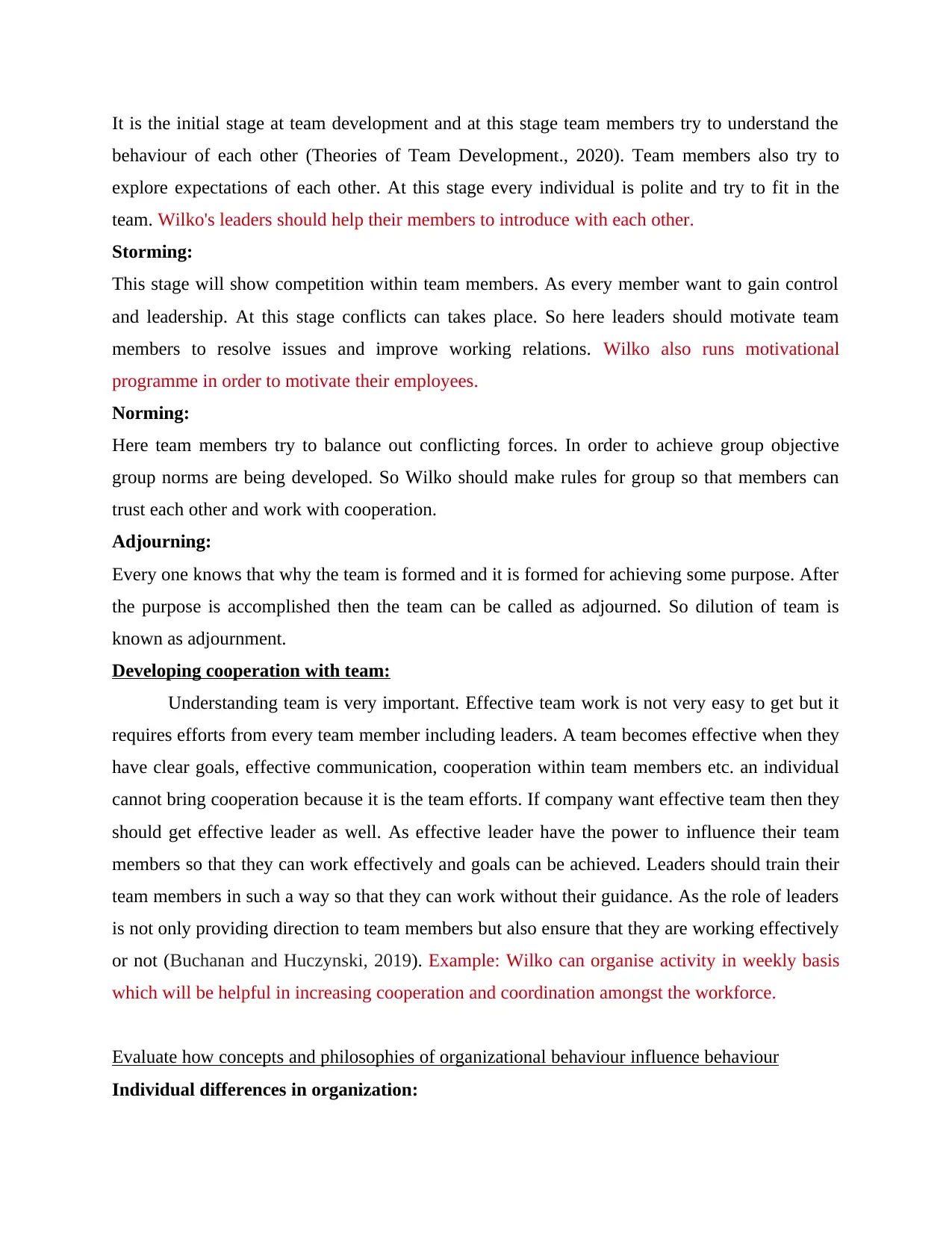
It is the initial stage at team development and at this stage team members try to understand the
behaviour of each other (Theories of Team Development., 2020). Team members also try to
explore expectations of each other. At this stage every individual is polite and try to fit in the
team. Wilko's leaders should help their members to introduce with each other.
Storming:
This stage will show competition within team members. As every member want to gain control
and leadership. At this stage conflicts can takes place. So here leaders should motivate team
members to resolve issues and improve working relations. Wilko also runs motivational
programme in order to motivate their employees.
Norming:
Here team members try to balance out conflicting forces. In order to achieve group objective
group norms are being developed. So Wilko should make rules for group so that members can
trust each other and work with cooperation.
Adjourning:
Every one knows that why the team is formed and it is formed for achieving some purpose. After
the purpose is accomplished then the team can be called as adjourned. So dilution of team is
known as adjournment.
Developing cooperation with team:
Understanding team is very important. Effective team work is not very easy to get but it
requires efforts from every team member including leaders. A team becomes effective when they
have clear goals, effective communication, cooperation within team members etc. an individual
cannot bring cooperation because it is the team efforts. If company want effective team then they
should get effective leader as well. As effective leader have the power to influence their team
members so that they can work effectively and goals can be achieved. Leaders should train their
team members in such a way so that they can work without their guidance. As the role of leaders
is not only providing direction to team members but also ensure that they are working effectively
or not (Buchanan and Huczynski, 2019). Example: Wilko can organise activity in weekly basis
which will be helpful in increasing cooperation and coordination amongst the workforce.
Evaluate how concepts and philosophies of organizational behaviour influence behaviour
Individual differences in organization:
behaviour of each other (Theories of Team Development., 2020). Team members also try to
explore expectations of each other. At this stage every individual is polite and try to fit in the
team. Wilko's leaders should help their members to introduce with each other.
Storming:
This stage will show competition within team members. As every member want to gain control
and leadership. At this stage conflicts can takes place. So here leaders should motivate team
members to resolve issues and improve working relations. Wilko also runs motivational
programme in order to motivate their employees.
Norming:
Here team members try to balance out conflicting forces. In order to achieve group objective
group norms are being developed. So Wilko should make rules for group so that members can
trust each other and work with cooperation.
Adjourning:
Every one knows that why the team is formed and it is formed for achieving some purpose. After
the purpose is accomplished then the team can be called as adjourned. So dilution of team is
known as adjournment.
Developing cooperation with team:
Understanding team is very important. Effective team work is not very easy to get but it
requires efforts from every team member including leaders. A team becomes effective when they
have clear goals, effective communication, cooperation within team members etc. an individual
cannot bring cooperation because it is the team efforts. If company want effective team then they
should get effective leader as well. As effective leader have the power to influence their team
members so that they can work effectively and goals can be achieved. Leaders should train their
team members in such a way so that they can work without their guidance. As the role of leaders
is not only providing direction to team members but also ensure that they are working effectively
or not (Buchanan and Huczynski, 2019). Example: Wilko can organise activity in weekly basis
which will be helpful in increasing cooperation and coordination amongst the workforce.
Evaluate how concepts and philosophies of organizational behaviour influence behaviour
Individual differences in organization:
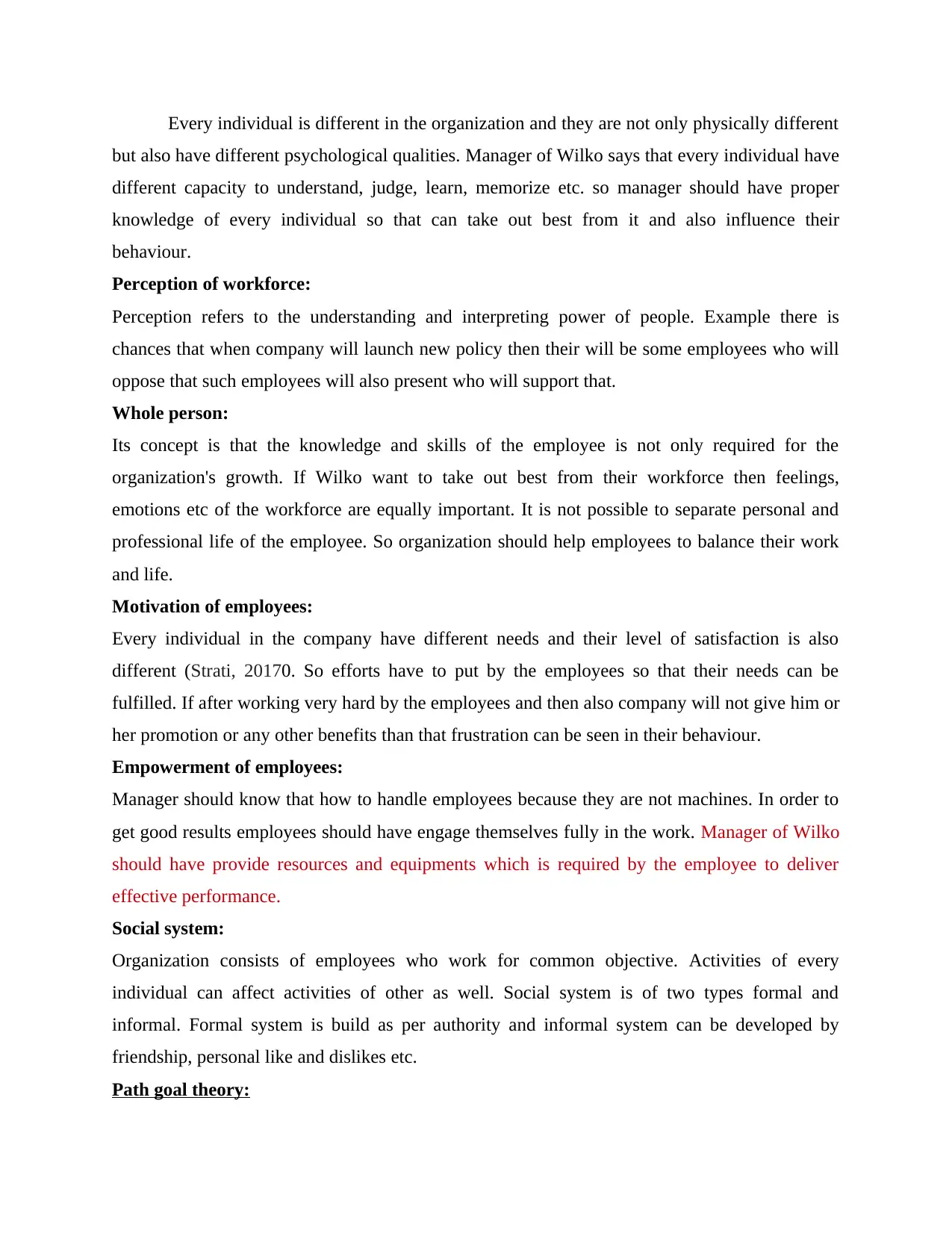
Every individual is different in the organization and they are not only physically different
but also have different psychological qualities. Manager of Wilko says that every individual have
different capacity to understand, judge, learn, memorize etc. so manager should have proper
knowledge of every individual so that can take out best from it and also influence their
behaviour.
Perception of workforce:
Perception refers to the understanding and interpreting power of people. Example there is
chances that when company will launch new policy then their will be some employees who will
oppose that such employees will also present who will support that.
Whole person:
Its concept is that the knowledge and skills of the employee is not only required for the
organization's growth. If Wilko want to take out best from their workforce then feelings,
emotions etc of the workforce are equally important. It is not possible to separate personal and
professional life of the employee. So organization should help employees to balance their work
and life.
Motivation of employees:
Every individual in the company have different needs and their level of satisfaction is also
different (Strati, 20170. So efforts have to put by the employees so that their needs can be
fulfilled. If after working very hard by the employees and then also company will not give him or
her promotion or any other benefits than that frustration can be seen in their behaviour.
Empowerment of employees:
Manager should know that how to handle employees because they are not machines. In order to
get good results employees should have engage themselves fully in the work. Manager of Wilko
should have provide resources and equipments which is required by the employee to deliver
effective performance.
Social system:
Organization consists of employees who work for common objective. Activities of every
individual can affect activities of other as well. Social system is of two types formal and
informal. Formal system is build as per authority and informal system can be developed by
friendship, personal like and dislikes etc.
Path goal theory:
but also have different psychological qualities. Manager of Wilko says that every individual have
different capacity to understand, judge, learn, memorize etc. so manager should have proper
knowledge of every individual so that can take out best from it and also influence their
behaviour.
Perception of workforce:
Perception refers to the understanding and interpreting power of people. Example there is
chances that when company will launch new policy then their will be some employees who will
oppose that such employees will also present who will support that.
Whole person:
Its concept is that the knowledge and skills of the employee is not only required for the
organization's growth. If Wilko want to take out best from their workforce then feelings,
emotions etc of the workforce are equally important. It is not possible to separate personal and
professional life of the employee. So organization should help employees to balance their work
and life.
Motivation of employees:
Every individual in the company have different needs and their level of satisfaction is also
different (Strati, 20170. So efforts have to put by the employees so that their needs can be
fulfilled. If after working very hard by the employees and then also company will not give him or
her promotion or any other benefits than that frustration can be seen in their behaviour.
Empowerment of employees:
Manager should know that how to handle employees because they are not machines. In order to
get good results employees should have engage themselves fully in the work. Manager of Wilko
should have provide resources and equipments which is required by the employee to deliver
effective performance.
Social system:
Organization consists of employees who work for common objective. Activities of every
individual can affect activities of other as well. Social system is of two types formal and
informal. Formal system is build as per authority and informal system can be developed by
friendship, personal like and dislikes etc.
Path goal theory:
⊘ This is a preview!⊘
Do you want full access?
Subscribe today to unlock all pages.

Trusted by 1+ million students worldwide
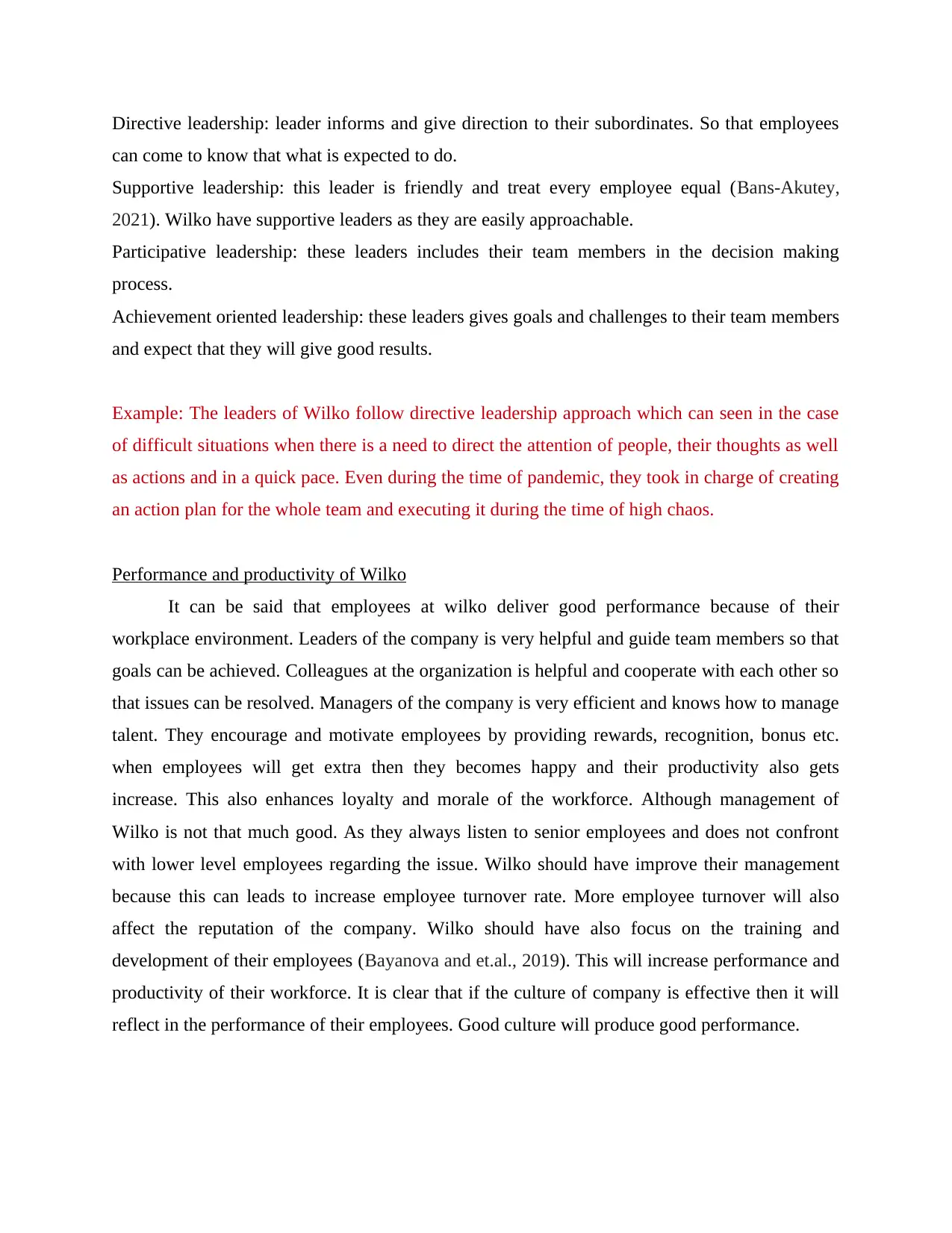
Directive leadership: leader informs and give direction to their subordinates. So that employees
can come to know that what is expected to do.
Supportive leadership: this leader is friendly and treat every employee equal (Bans-Akutey,
2021). Wilko have supportive leaders as they are easily approachable.
Participative leadership: these leaders includes their team members in the decision making
process.
Achievement oriented leadership: these leaders gives goals and challenges to their team members
and expect that they will give good results.
Example: The leaders of Wilko follow directive leadership approach which can seen in the case
of difficult situations when there is a need to direct the attention of people, their thoughts as well
as actions and in a quick pace. Even during the time of pandemic, they took in charge of creating
an action plan for the whole team and executing it during the time of high chaos.
Performance and productivity of Wilko
It can be said that employees at wilko deliver good performance because of their
workplace environment. Leaders of the company is very helpful and guide team members so that
goals can be achieved. Colleagues at the organization is helpful and cooperate with each other so
that issues can be resolved. Managers of the company is very efficient and knows how to manage
talent. They encourage and motivate employees by providing rewards, recognition, bonus etc.
when employees will get extra then they becomes happy and their productivity also gets
increase. This also enhances loyalty and morale of the workforce. Although management of
Wilko is not that much good. As they always listen to senior employees and does not confront
with lower level employees regarding the issue. Wilko should have improve their management
because this can leads to increase employee turnover rate. More employee turnover will also
affect the reputation of the company. Wilko should have also focus on the training and
development of their employees (Bayanova and et.al., 2019). This will increase performance and
productivity of their workforce. It is clear that if the culture of company is effective then it will
reflect in the performance of their employees. Good culture will produce good performance.
can come to know that what is expected to do.
Supportive leadership: this leader is friendly and treat every employee equal (Bans-Akutey,
2021). Wilko have supportive leaders as they are easily approachable.
Participative leadership: these leaders includes their team members in the decision making
process.
Achievement oriented leadership: these leaders gives goals and challenges to their team members
and expect that they will give good results.
Example: The leaders of Wilko follow directive leadership approach which can seen in the case
of difficult situations when there is a need to direct the attention of people, their thoughts as well
as actions and in a quick pace. Even during the time of pandemic, they took in charge of creating
an action plan for the whole team and executing it during the time of high chaos.
Performance and productivity of Wilko
It can be said that employees at wilko deliver good performance because of their
workplace environment. Leaders of the company is very helpful and guide team members so that
goals can be achieved. Colleagues at the organization is helpful and cooperate with each other so
that issues can be resolved. Managers of the company is very efficient and knows how to manage
talent. They encourage and motivate employees by providing rewards, recognition, bonus etc.
when employees will get extra then they becomes happy and their productivity also gets
increase. This also enhances loyalty and morale of the workforce. Although management of
Wilko is not that much good. As they always listen to senior employees and does not confront
with lower level employees regarding the issue. Wilko should have improve their management
because this can leads to increase employee turnover rate. More employee turnover will also
affect the reputation of the company. Wilko should have also focus on the training and
development of their employees (Bayanova and et.al., 2019). This will increase performance and
productivity of their workforce. It is clear that if the culture of company is effective then it will
reflect in the performance of their employees. Good culture will produce good performance.
Paraphrase This Document
Need a fresh take? Get an instant paraphrase of this document with our AI Paraphraser
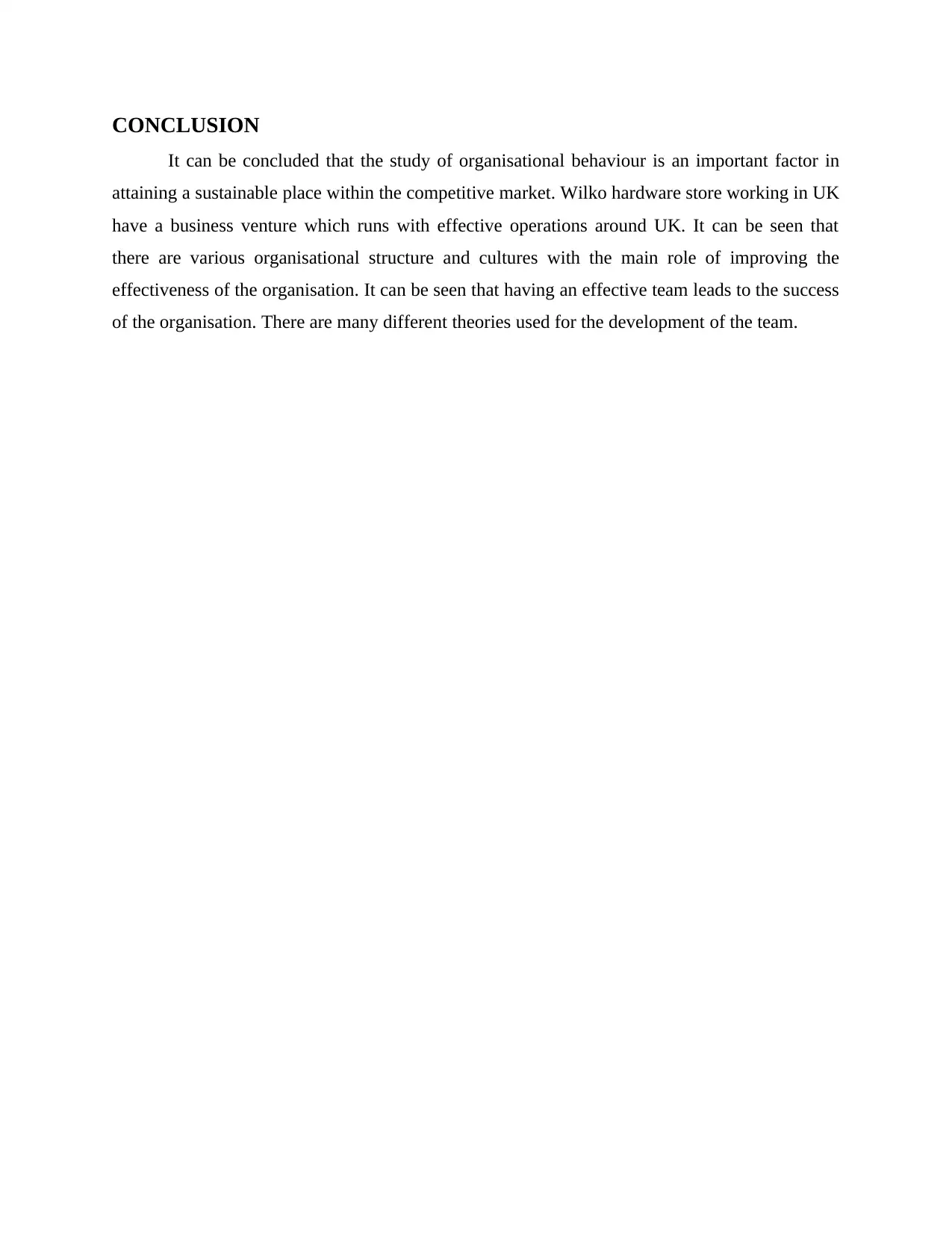
CONCLUSION
It can be concluded that the study of organisational behaviour is an important factor in
attaining a sustainable place within the competitive market. Wilko hardware store working in UK
have a business venture which runs with effective operations around UK. It can be seen that
there are various organisational structure and cultures with the main role of improving the
effectiveness of the organisation. It can be seen that having an effective team leads to the success
of the organisation. There are many different theories used for the development of the team.
It can be concluded that the study of organisational behaviour is an important factor in
attaining a sustainable place within the competitive market. Wilko hardware store working in UK
have a business venture which runs with effective operations around UK. It can be seen that
there are various organisational structure and cultures with the main role of improving the
effectiveness of the organisation. It can be seen that having an effective team leads to the success
of the organisation. There are many different theories used for the development of the team.
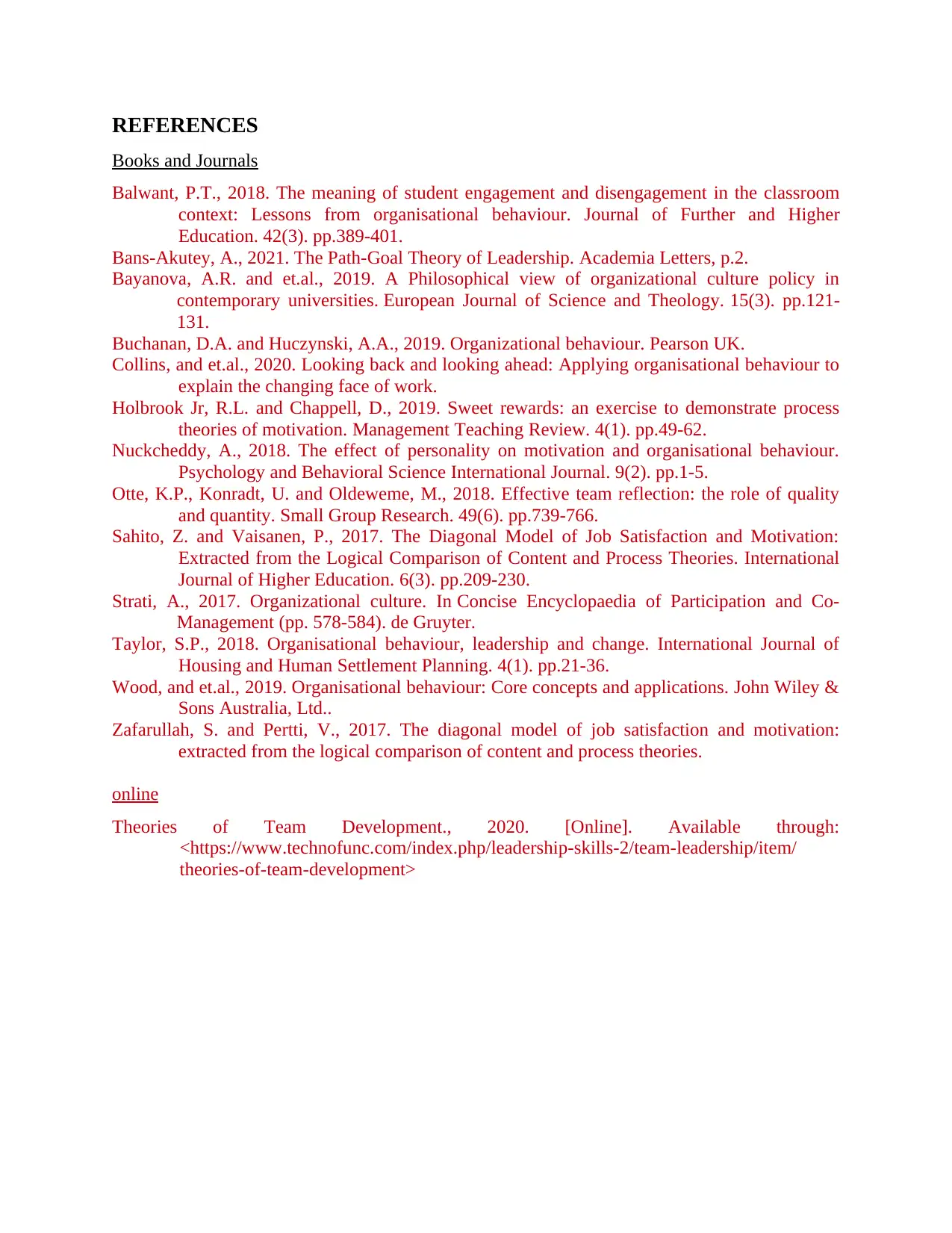
REFERENCES
Books and Journals
Balwant, P.T., 2018. The meaning of student engagement and disengagement in the classroom
context: Lessons from organisational behaviour. Journal of Further and Higher
Education. 42(3). pp.389-401.
Bans-Akutey, A., 2021. The Path-Goal Theory of Leadership. Academia Letters, p.2.
Bayanova, A.R. and et.al., 2019. A Philosophical view of organizational culture policy in
contemporary universities. European Journal of Science and Theology. 15(3). pp.121-
131.
Buchanan, D.A. and Huczynski, A.A., 2019. Organizational behaviour. Pearson UK.
Collins, and et.al., 2020. Looking back and looking ahead: Applying organisational behaviour to
explain the changing face of work.
Holbrook Jr, R.L. and Chappell, D., 2019. Sweet rewards: an exercise to demonstrate process
theories of motivation. Management Teaching Review. 4(1). pp.49-62.
Nuckcheddy, A., 2018. The effect of personality on motivation and organisational behaviour.
Psychology and Behavioral Science International Journal. 9(2). pp.1-5.
Otte, K.P., Konradt, U. and Oldeweme, M., 2018. Effective team reflection: the role of quality
and quantity. Small Group Research. 49(6). pp.739-766.
Sahito, Z. and Vaisanen, P., 2017. The Diagonal Model of Job Satisfaction and Motivation:
Extracted from the Logical Comparison of Content and Process Theories. International
Journal of Higher Education. 6(3). pp.209-230.
Strati, A., 2017. Organizational culture. In Concise Encyclopaedia of Participation and Co-
Management (pp. 578-584). de Gruyter.
Taylor, S.P., 2018. Organisational behaviour, leadership and change. International Journal of
Housing and Human Settlement Planning. 4(1). pp.21-36.
Wood, and et.al., 2019. Organisational behaviour: Core concepts and applications. John Wiley &
Sons Australia, Ltd..
Zafarullah, S. and Pertti, V., 2017. The diagonal model of job satisfaction and motivation:
extracted from the logical comparison of content and process theories.
online
Theories of Team Development., 2020. [Online]. Available through:
<https://www.technofunc.com/index.php/leadership-skills-2/team-leadership/item/
theories-of-team-development>
Books and Journals
Balwant, P.T., 2018. The meaning of student engagement and disengagement in the classroom
context: Lessons from organisational behaviour. Journal of Further and Higher
Education. 42(3). pp.389-401.
Bans-Akutey, A., 2021. The Path-Goal Theory of Leadership. Academia Letters, p.2.
Bayanova, A.R. and et.al., 2019. A Philosophical view of organizational culture policy in
contemporary universities. European Journal of Science and Theology. 15(3). pp.121-
131.
Buchanan, D.A. and Huczynski, A.A., 2019. Organizational behaviour. Pearson UK.
Collins, and et.al., 2020. Looking back and looking ahead: Applying organisational behaviour to
explain the changing face of work.
Holbrook Jr, R.L. and Chappell, D., 2019. Sweet rewards: an exercise to demonstrate process
theories of motivation. Management Teaching Review. 4(1). pp.49-62.
Nuckcheddy, A., 2018. The effect of personality on motivation and organisational behaviour.
Psychology and Behavioral Science International Journal. 9(2). pp.1-5.
Otte, K.P., Konradt, U. and Oldeweme, M., 2018. Effective team reflection: the role of quality
and quantity. Small Group Research. 49(6). pp.739-766.
Sahito, Z. and Vaisanen, P., 2017. The Diagonal Model of Job Satisfaction and Motivation:
Extracted from the Logical Comparison of Content and Process Theories. International
Journal of Higher Education. 6(3). pp.209-230.
Strati, A., 2017. Organizational culture. In Concise Encyclopaedia of Participation and Co-
Management (pp. 578-584). de Gruyter.
Taylor, S.P., 2018. Organisational behaviour, leadership and change. International Journal of
Housing and Human Settlement Planning. 4(1). pp.21-36.
Wood, and et.al., 2019. Organisational behaviour: Core concepts and applications. John Wiley &
Sons Australia, Ltd..
Zafarullah, S. and Pertti, V., 2017. The diagonal model of job satisfaction and motivation:
extracted from the logical comparison of content and process theories.
online
Theories of Team Development., 2020. [Online]. Available through:
<https://www.technofunc.com/index.php/leadership-skills-2/team-leadership/item/
theories-of-team-development>
⊘ This is a preview!⊘
Do you want full access?
Subscribe today to unlock all pages.

Trusted by 1+ million students worldwide
1 out of 13
Related Documents
Your All-in-One AI-Powered Toolkit for Academic Success.
+13062052269
info@desklib.com
Available 24*7 on WhatsApp / Email
![[object Object]](/_next/static/media/star-bottom.7253800d.svg)
Unlock your academic potential
Copyright © 2020–2025 A2Z Services. All Rights Reserved. Developed and managed by ZUCOL.





